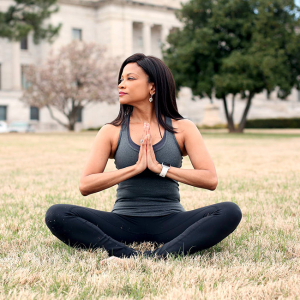Struggle and Flow: How Mindfulness Is Changing the Trend of Tension

Stop and smell the roses. That’s the advice often offered to those who are overworked and under pressure, as if the answer is as simple as budgeting a few minutes to sniff some flora on your morning commute.
This advice is often met with an eye roll, and that’s because stressed people know that stress is no small matter. According to the American Institute of Stress, stress causes 60 percent of human illness, increasing the risk of heart attack by 25 percent, heart disease by 40 percent and stroke by 50 percent. And while one in five Americans experiences extreme stress, more than 75 percent of Americans regularly experience physical symptoms brought on by stress like fatigue, headache and muscle tension.
“Your body has the same reaction whether you’re being chased by a bear or chased by a deadline,” says George Crook of the Curatio Mindfulness Project in Hot Springs. “When a bear is chasing you, you want the epinephrine, you want that fight or flight response. But being in that state constantly — which is exactly what stress is — is bad for your body, depletes your immune system and makes you less effective.”
So is there any truth in the “smell the roses” idea? It turns out that very principle is at the core of mindfulness-based stress reduction (MBSR), a practice more and more Arkansans are joining to help defy the effects of stress in the workplace, at home and beyond.
Mindfulness uses physical awareness to experience and process what is happening at the present moment. The purpose of MBSR is not to eradicate stress, but to change your relationship with discomfort and to “develop a compassionate approach toward yourself” and your habits. It focuses on recognizing challenges and learning how to minimize the struggle of stress.
“It’s about learning the wisdom of the body,” Crook says. “Your body will give you signals if you listen to it.”
Through an eight-week MBSR program, Crook helps students identify their signals (like fidgeting or jaw clenching) and learn how to apply mindful skills and attitudes in their daily lives.
Some of the formal techniques include actions like yoga and meditation, but the goal is to make mindfulness a part of regular activities — think focusing on the feeling of brushing your teeth or practicing deep breathing while waiting in line.
The daily incorporation of these tactics doesn’t just have an effect on factors like heart health, but also on daily behaviors. Studies show that MBSR significantly reduces hostility and impulsivity while boosting cognition and attention.
According to Crook, however, the core benefit of mindfulness is the power of choice. As you become more aware of your surroundings, you begin to learn more about your personal triggers and habitual reactions to stress. This awareness enables you to take yourself off of autopilot and decide how to let pressures affect you and how to respond to them.
“There’s this switch that happens from an outside-in mentality to inside-out,” Crook says. “Our culture says the world defines your purpose and worth and behaviors. Mindfulness helps you create positive outcomes in the world, and your situation then becomes a result of what you’re doing on the inside.”
The effects of adopting MBSR even caught the attention of Fortune 500 companies across the nation. Names like Google, Apple and Procter & Gamble dot the list of those who have introduced the practice into their workplaces. In fact, Google believes so deeply in its mindfulness program Search Inside Yourself that they now offer it to other businesses to help lower office stress.
“It keeps me functioning,” Crook says. “I’m happier, have a more positive attitude and am more efficient when I’m mindful. It’s just a matter of being curious and learning what tactics work for you.”
Common Body Signals
Your body gives you subconscious clues when anxiety is on the rise. Some of the most common are fidgeting, clenching your fists, stuttering, grinding your teeth and irregular breathing. According to Crook, you don’t have to understand where your signals originated, just recognize your pattern so you know how to head it off.
Here are some easy tactics Crook suggests for helping you reevaluate and recenter.
- Look out the window for a few minutes and watch the leaves blow or cars go by
- Take a trip to the sink or water fountain
- Type slow and rhythmically
- Stand up and stretch
- Make difficult decisions by saying options out loud and noticing how your body reacts







